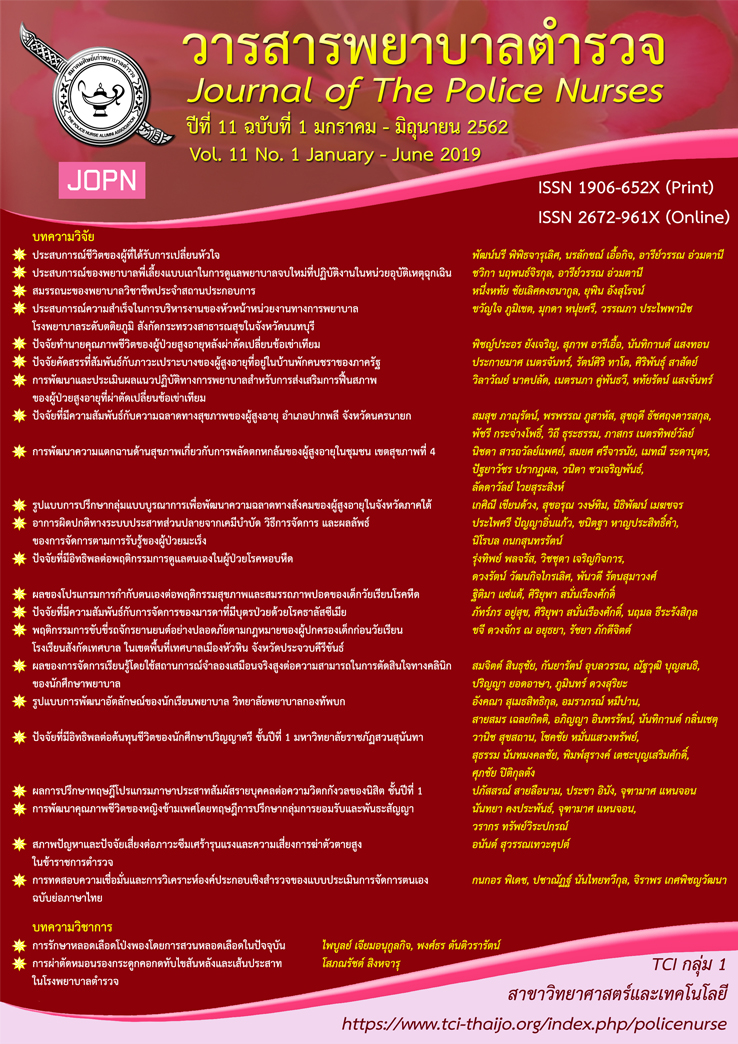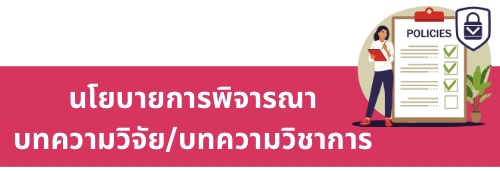การพัฒนาคุณภาพชีวิตของหญิงข้ามเพศโดยทฤษฎีการปรึกษากลุ่มการยอมรับและพันธะสัญญา
คำสำคัญ:
คุณภาพชีวิต, ทฤษฎีการยอมรับและพันธะสัญญา, หญิงข้ามเพศบทคัดย่อ
การวิจัยครั้งนี้เป็นการวิจัยผสานวิธี มีวัตถุประสงค์เพื่อพัฒนาโปรแกรมการปรึกษากลุ่มทฤษฎีการยอมรับและพันธะสัญญาต่อการพัฒนาคุณภาพชีวิตของหญิงข้ามเพศ และเปรียบเทียบประสิทธิภาพของโปรแกรมการปรึกษากลุ่มทฤษฎีการยอมรับและพันธะสัญญาต่อการพัฒนาคุณภาพชีวิตของหญิงข้ามเพศ ร่วมกับการศึกษาคุณภาพชีวิตของหญิงข้ามเพศในเชิงคุณภาพขณะเข้าร่วมการวิจัย ตัวอย่าง ได้แก่ หญิงข้ามเพศที่เข้ารับบริการ ณ เครือข่ายสุขภาพและโอกาส เขตพัทยา จังหวัดชลบุรี อายุระหว่าง 25 - 47 ปี ที่มีคะแนนเฉลี่ยคุณภาพชีวิตน้อยกว่าหรือเท่ากับเปอร์เซ็นไทล์ที่ 25 จำนวน 18 คน สุ่มอย่างง่ายเป็นกลุ่มทดลองและกลุ่มควบคุม กลุ่มละ 9 คน กลุ่มทดลองได้รับการปรึกษากลุ่มทฤษฎีการยอมรับและพันธะสัญญาจำนวน 16 ครั้ง (60 - 90 นาทีต่อครั้ง) แบบมาราธอน 3 วัน ส่วนกลุ่มควบคุมได้รับการปรึกษาตามวิธีปกติ เครื่องมือที่ใช้ในการวิจัยประกอบด้วย แบบวัดคุณภาพชีวิตขององค์การอนามัยโลกชุดย่อ ฉบับภาษาไทย และโปรแกรมการปรึกษากลุ่มทฤษฎีการยอมรับและพันธะสัญญาที่ผู้วิจัยสร้างขึ้น เก็บรวบรวมข้อมูล 3 ระยะ ได้แก่ ระยะก่อนการทดลอง ระยะหลังการทดลอง และระยะติดตามผล
การวิเคราะห์ข้อมูลใช้การวิเคราะห์ความแปรปรวนแบบวัดซ้ำหนึ่งตัวแปรระหว่างกลุ่มและหนึ่งตัวแปรภายในกลุ่ม ทดสอบความแตกต่างเป็นรายคู่ด้วยวิธีของนิวแมน-คูลส์
ผลการวิจัยพบว่า มีปฏิสัมพันธ์ระหว่างวิธีการทดลองและระยะเวลาการทดลองอย่างมีนัยสำคัญทางสถิติ (p < .05) หญิงข้ามเพศกลุ่มทดลองมีคะแนนเฉลี่ยคุณภาพชีวิตสูงกว่าหญิงข้ามเพศกลุ่มควบคุมในระยะหลังการทดลองอย่างมีนัยสำคัญทางสถิติ (p < .05) หญิงข้ามเพศกลุ่มทดลองมีคะแนนเฉลี่ยคุณภาพชีวิตสูงกว่าหญิงข้ามเพศกลุ่มควบคุมในระยะติดตามผลอย่างมีนัยสำคัญทางสถิติ (p < .05) และหญิงข้ามเพศกลุ่มทดลองมีคะแนนเฉลี่ยคุณภาพชีวิตในระยะหลังการทดลองสูงกว่าระยะก่อนการทดลองอย่างมีนัยสำคัญทางสถิติ (p < .05) และหญิงข้ามเพศกลุ่มทดลองมีคะแนนเฉลี่ยคุณภาพชีวิตในระยะติดตามผลสูงกว่าในระยะก่อนการทดลองอย่างมีนัยสำคัญทางสถิติ (p < .05)
Downloads
เอกสารอ้างอิง
Hayes, S. C., Strosahl, K. D., & Wilson, K. G. (1999). Acceptance and commitment therapy: An experiential approach to behavior change. New York, NY: Guilford Press.
Heanjohn, J. (2014). A development of acceptance and commitment training program on enhancing social solving of undergraduate students. Journal of Education, Burapha University, 25(3), 98-112.
Howell, D. C. (2007). Statistical methods for psychology (6th ed.). Belmont, CA: Thomson Wadsworth.
Kongprapun, N. (2013). A study of quality of life of male to female transgender in Chonburi. Educational Psychology and Counseling, Faculty of Education, Burapha University,
Luoma, J. B., Hayes, S. C., & Walser, R. D. (2007). Learning ACT: An acceptance & commitment therapy skills-training manual for therapists. Oakland, CA: New Harbinger Publications.
Mahuntnirunkul, S., Tuntipivatanasakul, W., Pumpisanchai, W., Wongsuwan, K., & Promanajirangkul, R. (2002). Comparison of the WHOQOL - 100 and the WHOQOL - brief (26 items). Department of Mental Health, Suanprung Hospital, Chiang Mai.
Potiwan, P., Tongyu, M., & Apichatvullop, Y. (2012). The construction of transgenders’ social space. Journal of humanities and social sciences Mahasarakham University, 31(5), 97-110.
ดาวน์โหลด
เผยแพร่แล้ว
รูปแบบการอ้างอิง
ฉบับ
ประเภทบทความ
สัญญาอนุญาต
ผลงานที่ได้ตีพิมพ์แล้วจะเป็นลิขสิทธิ์ของวารสารพยาบาลตำรวจ















